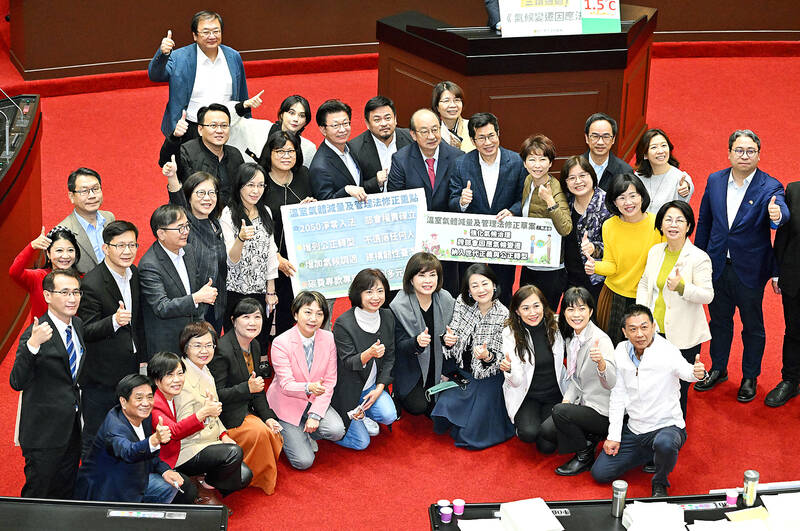The legislature yesterday passed amendments to climate change laws, officially setting 2050 as the deadline to achieve carbon neutrality and establish a carbon pricing system.
The Executive Yuan in April last year proposed the amendments to the Greenhouse Gas Reduction and Management Act (溫室氣體減量及管理法), which among other changes renames it the Climate Change Adaptation Act (氣候變遷因應法).
Since then, the bill has gone through committee and cross-party negotiations at the legislature, but consensus remained elusive on provisions such as the 2050 goal, oversight and carbon pricing.

Photo: Liao Chen-huei, Taipei Times
The legislature yesterday voted on the remaining provisions and the Democratic Progressive Party’s versions passed due to its majority.
If approved by the Executive Yuan, the bill would establish a national goal of achieving carbon neutrality by 2050.
To achieve this, it instructs all levels of government to work with citizens, businesses and civil groups to reduce emissions, as well as promote negative emissions technologies and international cooperation.
It would task the Executive Yuan’s National Council of Sustainable Development with negotiating, delegating and coordinating national responses to climate change, while the central government would be ordered to develop an action plan that is reviewed at least once every four years.
Local governments would work with experts and civil groups to form an implementation strategy that meets the requirements of the national action plan, which would be sent to a dedicated committee to execute, the bill says.
For economic incentives, the final version establishes a carbon taxing mechanism, with the central government as the sole collector.
If a payer is able to meet carbon reduction goals by converting to low or zero-carbon fuel, adopting negative emissions technology, improving energy efficiency or improving manufacturing, they would be eligible for a preferential rate.
Entities that intentionally report false information or alter data would be subject to a doubled fee plus interest.
Importers would be required to declare emissions linked to their products and pay accordingly.
All proceeds must be allocated to a climate change response fund, which is to be used for emissions source inspections, national and local carbon reduction efforts, subsidies and rewards for businesses working on greenhouse gas reduction technologies, transitional justice and other related matters, the bill says.
A public report detailing allocation of the funds and results must be made every two years, it says.
It also bolsters provisions for training, and promoting research into carbon technologies, and adds mechanisms to improve transparency and promote public participation.
The Environmental Protection Administration is to work out details of the carbon pricing scheme, which is to be implemented next year at the earliest.
The first stage of the rollout would target about 287 companies that emit at least 25,000 tonnes of carbon annually, comprising nearly 80 percent of the nation’s emissions.

A strong continental cold air mass is to bring pollutants to Taiwan from tomorrow, the Ministry of Environment said today, as it issued an “orange” air quality alert for most of the country. All of Taiwan except for Hualien and Taitung counties is to be under an “orange” air quality alert tomorrow, indicating air quality that is unhealthy for sensitive groups. In China, areas from Shandong to Shanghai have been enveloped in haze since Saturday, the ministry said in a news release. Yesterday, hourly concentrations of PM2.5 in these areas ranged from 65 to 160 micrograms per cubic meter (mg/m³), and pollutants were

Taiwan’s armed forces have established response protocols for a wide range of sudden contingencies, including the “Wan Chun Plan” to protect the head of state, the Ministry of Defense (MND) said today. After US President Donald Trump on Saturday launched a series of airstrikes in Venezuela and kidnapped Venezuelan President Nicolas Maduro, concerns have been raised as to whether China would launch a similar “decapitation strike” on Taiwan. The armed forces regularly coordinate with relevant agencies and practice drills to ensure preparedness for a wide range of scenarios, Vice Minister of National Defense Hsu Szu-chien (徐斯儉) told reporters before a

EVA Airways on Saturday said that it had suspended a pilot and opened an investigation after he allegedly lost his temper and punched the first officer several times as their plane was taxiing before takeoff at Los Angeles International Airport. According to a report published on Thursday by The Reporter, the incident occurred after the flight’s Malaysian first officer tried to warn the Taiwanese pilot, surnamed Wen (文), that he was taxiing faster than the speed limit of 30 knots (55.6kph). After alerting the pilot several times without response, the first officer manually applied the brakes in accordance with standard operating

Japanese Councilor Hei Seki (石平) on Wednesday said that he plans to visit Taiwan, saying that would “prove that Taiwan is an independent country and does not belong to China.” Seki, a member of the Japan Innovation Party, was born in Chengdu in China’s Sichuan Province and became a naturalized Japanese in 2007. He was elected to the House of Concilors last year. His views on the Chinese Communist Party (CCP) — espoused in a series of books on politics and history — prompted Beijing to sanction him, including barring Seki from traveling to China. Seki wrote on X that he intends